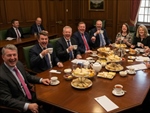#PhoneHackingScandal

#PhoneHackingScandal

The News of the World phone hacking scandal was a major media and political controversy in the United Kingdom that came to light in the early 2000s and peaked in 2011. Journalists and private investigators working for the British tabloid were found to have illegally accessed the voicemails of celebrities, politicians, members of the royal family, and even victims of crime, most notably murdered schoolgirl Milly Dowler. The revelation that the tabloid had deleted voicemails from Dowler’s phone sparked public outrage and led to the closure of the 168-year-old newspaper in July 2011. The scandal prompted multiple police investigations, high-profile arrests, and the Leveson Inquiry—a public investigation into press ethics and regulation. It exposed deep ethical failures within parts of the British press and raised serious concerns about media power and accountability.
Piers Morgan denies knowing of phone hacking after judge rule there ‘can be no doubt’ that he knew
- Friday, 15 December 2023
Piers Morgan has denied he was aware of phone hacking during his time as Daily Mirror editor after a judge ruled there ‘can be no doubt’ that he knew about the practice while he was at the helm of the newspaper. The TalkTV presenter also hit out at Prince Harry, saying he ‘wouldn’t know truth if it slapped him in his California-tanned face’.
Paxman: Piers Morgan Taught Me How to Hack Voicemails
- Tuesday, 23 May 2023
At the Leveson Inquiry into press ethics in 2012, Newsnight presenter Jeremy Paxman recounted an unsettling incident involving former tabloid editor Piers Morgan. Paxman testified that during a lunch in September 2002, Morgan "gave a sort of demonstration" on how to hack into people's voicemail messages. According to Paxman, Morgan explained the practice by noting how easy it was to access voicemail by simply calling a number and entering a default PIN. Paxman said he remembered the moment vividly because he found it "depressing," highlighting the casual attitude toward privacy violations at the time. His account added to the growing evidence of widespread and normalized phone hacking practices within sections of the British media.
Rebekah Brooks Defends Conduct at Leveson Inquiry
- Thursday, 30 July 2015
Rebekah Brooks, former chief executive of News International, appeared before the Leveson Inquiry to defend her role in the practices that led to the phone hacking scandal. Under intense questioning, Brooks denied any knowledge of illegal activity during her time as editor of The Sun and News of the World. She insisted she had never authorised or been aware of unlawful newsgathering methods. Brooks was also pressed on her close relationships with senior politicians and police officials, relationships critics argue contributed to a culture of inappropriate influence between the media and public institutions. Giving measured and cautious answers, Brooks rejected suggestions of wrongdoing and portrayed herself as a victim of events beyond her control. Her testimony marked a key moment in Lord Justice Leveson's examination of the culture, practices, and ethics of the British press.
Piers Morgan Denies Phone Hacking at Daily Mirror During His Tenure as Editor
- Tuesday, 20 December 2011
Piers Morgan, former editor of the Daily Mirror, testified at the Leveson Inquiry that he was not aware of any phone hacking taking place while he was in charge. He denied suggestions that phone hacking was "endemic" at the Mirror and stated that no formal complaints had been made against the paper for phone hacking. Morgan also spoke about an investigation by the Information Commissioner's Office, which found that 45 Mirror journalists were mentioned in the files of private investigator Steve Whittamore.




















